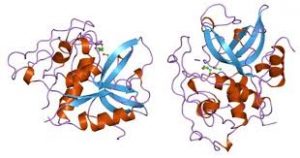Cathepsin B:

Researchers at the National Institute of Animal Biotechnology (NIAB) found that reducing the activity of a cellular protein called ‘Cathepsin B’ (Cat B) helps preserve the ovarian reserve.
- Cathepsin B is a lysosomal cysteine protease.
- It is primarily localized within subcellular endosomal and lysosomal compartments. It is involved in the turnover of intracellular and extracellular proteins.
- It is integrated into almost all lysosome-related processes, including protein turnover, degradation, lysosome-mediated cell death, antigen processing and apoptosis.
- It degrades extracellular matrix proteins like collagen and fibronectin.
- It is involved in neuropathological and neurodegenerative diseases such as dementia, Alzheimer’s disease, and traumatic brain injury.
- This ovarian reserve is the finite pool of egg cells (oocytes) that female mammals are born with. Unlike sperm, these crucial egg cells cannot be regenerated.
- Over time, the quantity and quality of these eggs naturally decline due to factors like oxidative stress, inflammation and general cellular wear.
- This process accelerates with age. ‘Cat B,’ a protein-degrading enzyme, seems to be a key driver of this decline.
- By lowering its levels, we may be able to delay egg loss, effectively extending fertility naturally.




